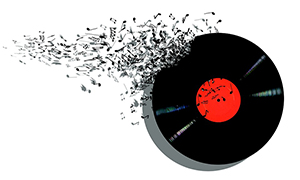Are jukeboxes stronger than ever or is this their swan song?

It has been 20 years since Napster introduced us to file sharing, starting a chain of events that had the biggest impact on the music industry since the invention of recording.
The detrimental impact of piracy on the music industry is well documented, as is the fact that online technology has evolved far more quickly in the last two decades than the legislation that has attempted to govern it.
Some profits have been salvaged by embracing the streaming revolution with applications including Spotify, Pandora, Apple Music, Deezer and, to a lesser extent, Tidal.
The way people take in this content has changed but has the sector changed enough to keep up with that? Popular artists have historically expected to make a lot of money for their work, as have record labels, and they have been loath to change that in order to appeal to those listeners who now expect music for free.
The jukebox industry is a prime example of a format that has had to change dramatically in order to appeal to a customer base that has all their favourite music on a device in their pocket. One of the ways has been to try to work with and emulate such devices.
TouchTunes launched Playdium in the UK in October 2016 and over that period it has marketed itself to operators as the next generation of jukebox and the “world’s smartest jukebox.” It offers venues a variety of music profiles in order to tailor the experience to suit their location and customer base. It learns from the music selected and intuitively adapts over time.
“Where previously delivering a ‘reasonable’ experience was acceptable, people now carry a supercomputer in their pocket,” said Toby Hoyte, sales and marketing manager at TouchTunes.
“They want at least the same level of experience as they are used to on their phones. When they walk up to a jukebox they expect a responsive touchscreen, they expect the music selection on the same level as Spotify or Apple Music and they expect sound quality. Playdium is the only jukebox that delivers all these elements, which gets people to engage and gets them to come back, which we see in the uplift in coinage that happens directly after installation.
“The benchmark for the visitor is the mobile phone, and with the amount of innovation happening in that field it is very hard to compete with that experience. It takes the scale of a company like TouchTunes and its continuous, substantial investment in R&D to deliver that,” he said.
One of the things many new operators may be unaware of is that even if they have paid for a jukebox, that doesn’t mean they can play music publically. For that, they need a licence. This goes to pay the artist of the music, because that music is being used to enhance the experience of an operation.
PPL is an organisation responsible for licensing for publicly played music, its mission statement being to “ensure that those who invest their time, talent and money to make recorded music are fairly paid for their work.”
In an effort to make this more straightforward for the licence holder, PPL – who represent performers and record companies –has formed a joint music licence with PRS for Music, which does the same for songwriters, composers and publishers. Before now a business in the UK would have had to have a licence from both to play a range of music worth listening to. Now, they simply need TheMusicLicence from the joint venture, PPL PRS.
This is possibly yet another impact of the changing nature of the music industry, that those collecting money for it feel the need to join forces.
That being said, in 2016, the two companies generated almost £270m through the licensing of live and recorded music to businesses and organisations - from bars, pubs and clubs to hairdressers, fitness centres and hotels. Its communications manager, Alexandra Burns, told InterGame that it projects incomes exceeding £300m for 2018.
She believes that there is still a market for jukeboxes today (which come under a background music licence), even in a world where people have largely grown to expect music for free but, she said, it depends heavily on the demographic.
“Younger people are so used to having music at their constant disposal, they then find a jukebox unnecessary, whereas people who are slightly older will actually enjoy the experience of using one. It’s not the event that it used to be but I have found, from my own experience, that when there is a jukebox in a bar it tends to be quite popular,” she said.
She made the point that a music system that people have control over in a public place creates a social interaction. “It inspires conversation that you might not have otherwise. You speak more about your taste in music and the concerts you have been to. Yes, we have music on demand now but we tend to listen to that on our own because it is specific to our own taste, but when you are in a social environment you need to compromise, which is what socialising is all about,” she said.
So, jukeboxes may not be going anywhere yet but they will need to continue adapting to a rapidly changing world if they hope to keep marching to a profitable beat.

